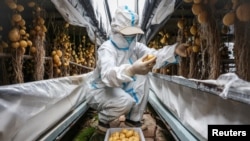ນັກຊີວະວິທະຍາໂມເລກຸນ ຈີນ ທ່ານ ຫຼີ ເຈຍປິງ ແລະ ທີມງານຂອງທ່ານແມ່ນກຳລັງຟ້າວທີ່ຈະພັດທະນາ “ສຸດຍອດມັນຝຣັ່ງ”, ເຊິ່ງແມ່ນຊະນິດທີ່ຕ້ານທານຕໍ່ອຸນຫະພູມທີ່ຮ້ອນຂຶ້ນ, ຍ້ອນຄວາມຢ້ານກົວກ່ຽວກັບສະພາບອາກາດປ່ຽນແປງ.
ການສຶກສາສາມເດືອນຂອງເຂົາເຈົ້າໃນນະຄອນຫຼວງ ປັກກິ່ງ ໄດ້ຄົ້ນຄວ້າຫາຜົນກະທົບ ກ່ຽວກັບ ອຸນຫະພູມສູງຕໍ່ຜົນຜະລິດຂອງພືດ.
ມັນຝຣັ່ງປົກກະຕິທີ່ປູກໃນແຂວງ ເຮີເບ ທາງພາກເໜືອຂອງ ຈີນ ແລະ ໃນປະເທດ ມົງໂກເລຍ ແມ່ນມັກຈະມີຂະໜາດສອງເທົ່າຂອງໝາກບານ ເບສບອລ.
ແຕ່ມັນຝຣັ່ງທີ່ເຂົາເຈົ້າປູກຢູ່ໃນການສຶກສາ, ເຊິ່ງບາງໜ່ວຍແມ່ນບໍ່ໃຫຍ່ກວ່າໄຂ່ນົກກະທານັ້ນ, ໄດ້ເປັນສັນຍານທີ່ບໍ່ດີສຳລັບອະນາຄົດຂອງຄວາມໝັ້ນຄົງດ້ານອາຫານ.
ທ່ານ ຫຼີ ໄດ້ກ່າວວ່າ “ຂ້ອຍຮູ້ສຶກເປັນຫ່ວງຍ້ອນການປ່ຽນແປງຂອງອຸນຫະພູມ. ປັດຈຸບັນນີ້ຂ້ອຍໃຊ້ສິ່ງແວດລ້ອມທີ່ມີອຸນຫະພູມແຕກຕ່າງ ໃນອຸຫະພູມສະເລ່ຍ 3 ອົງສາແຊລຊຽສ ແລະ ມັນໄດ້ສົ່ງຜົນກະທົບຢ່າງຫຼວງຫຼາຍຕໍ່ຜົນຜະລິດ. ນັ້ນກໍໝາຍຄວາມວ່າ ອຸນຫະພູມທີ່ສູງຂຶ້ນ ມັນຈະຫຼຸດຜົນຜະລິດທີ່ມີຄວາມ ຫຼາກຫຼາຍຂອງມັນຝຣັ່ງໃນປັດຈຸບັນນີ້ລົງຢ່າງຫຼວງຫຼາຍ.”
ການສຶກສາຂອງທ່ານ ຫຼີ, ເຊິ່ງຢູ່ພາຍໃຕ້ສູນກາງມັນຝຣັ່ງສາກົນ ທີ່ມີຫ້ອງການຕັ້ງຢູ່ປະເທດ ເປຣູ, ໄດ້ດຳເນີນການດ້ວຍການເປັນຄູ່ຮ່ວມມືກັບລັດຖະບານ ຈີນ.
ປະເທດດັ່ງກ່າວແມ່ນຜູ້ຜະລິດມັນຝຣັ່ງລາຍໃຫຍ່ທີ່ສຸດຂອງໂລກ.
ແລະ ພືດດັ່ງກ່າວແມ່ນສຳຄັນຕໍ່ຄວາມໝັ້ນຄົງຂອງອາຫານໂລກ ຍ້ອນຜົນຜະລິດທີ່ສູງຂອງພວກມັນ ເມື່ອທຽບໃສ່ກັບພືດຫຼັກອື່ນໆ.
ແຕ່ມັນມີຄວາມສ່ຽງເປັນພິເສດຕໍ່ຄວາມຮ້ອນ.
ທ່ານ ຫຼີ ກ່າວວ່າ “ຍ້ອນແນວນັ້ນການນຳຂອງ ຈີນ ຈຶ່ງໃຫ້ຄວາມສົນໃຈ. ຄວາມເປັນຈິງຂອງສະພາບອາກາດປ່ຽນແປງແມ່ນກຳລັງເກີດຂຶ້ນ ແລະ ເຂົາເຈົ້າຮູ້ວ່ານີ້ອາດມີຜົນກະທົບດ້ານລົບຕໍ່ພາກກະສິກຳ. ສະນັ້ນເຂົາເຈົ້າຢາກຈະພັດທະນາຂໍ້ແກ້ໄຂຕ່າງໆ ແລະ ແຜນຍຸດທະສາດ ກ່ອນທີ່ຜົນກະທົບຈະເກີດຂຶ້ນ.”
ບັນດາຊາວນາໃນ ຈີນ ເວົ້າວ່າເຂົາເຈົ້າໄດ້ຮູ້ສຶກເຖິງຜົນກະທົບຂອງເຫດການສະພາບອາກາດຮ້າຍແຮງແລ້ວ.
ຢູ່ໃນປະເທດ ມົງໂກເລຍ, ຄົນງານຫຼາຍສິບຄົນຖືກະສອບສີຂາວພາກັນຟ້າວໄປເກັບເອົາມັນຝຣັ່ງທີ່ຂຸດຂຶ້ນມາຈາກດິນກ່ອນທີ່ຝົນຈະຕົກໜັກອີກຄັ້ງ.
ຜູ້ຈັດການ ທ່ານ ຫວັງ ຊີ ຢີ ກ່າວວ່າມັນໄດ້ຮັບຜົນກະທົບໂດຍອີກເຫດການນຶ່ງ ທີ່ໄດ້ກາຍເປັນເລື່ອງທົ່ວໄປ ຍ້ອນສະພາບອາກາດປ່ຽນແປງຄື ນ້ຳຖ້ວມ.
ທ່ານ ຫວັງ ກ່າວວ່າ “ສິ່ງທ້າທາຍທີ່ໃຫຍ່ທີ່ສຸດສຳລັບມັນຝຣັ່ງໃນປີນີ້ກໍແມ່ນຝົນຕົກໜັກ, ເຊິ່ງໄດ້ກໍ່ໃຫ້ເກີດຫຼາຍບັນຫາ. ຍົກຕົວຢ່າງການຂາດນ້ຳ, ແກ່ກ່ອນກຳນົດ, ແລະ ຍ້ອນຝົນຕົກເກີນຂະໜາດ, ມັນໄດ້ກໍ່ໃຫ້ເກີດໂຣກຫຼາຍຊະນິດ, ເຊັ່ນໂຣກໃບໄໝ້ ແລະ ບັນຫາອື່ນໆເຊັ່ນຫົວມັນເໜົ່າ.
ອ່ານຂ່າວນີ້ເປັນພາສາອັງກິດ
Driven by fear of climate change, Chinese molecular biologist Li Jieping and his team are racing to develop a 'super-potato' - one that is resistant to hotter temperatures.
Their three-month study in Beijing looked at the effect of higher temperatures on crop yields.
Typical tubers grown in northern Hebei and Inner Mongolia are often twice the size of a baseball.
But the potatoes they ended up with in the study, some no bigger than a quail's egg, were an ominous sign for future food security.
"I feel it is worrying because of the temperature changes. I'm currently using settings with a temperature difference of an average of 3 degrees Celsius and this has had a significant impact on yield. That means higher temperatures will notably reduce the output of current potato varieties."
Li's study, under the Peru-based International Potato Center, was done in partnership with the Chinese government.
The country is the world's biggest potato producer.
And the crop is crucial to global food security because of its high yield compared to other staple crops.
But it's especially vulnerable to heat.
"This is why China's leadership is paying attention. The reality is climate change is happening and they are aware that this could have a negative impact on agriculture. So they want to develop solutions and strategies before such impacts take hold."
Farmers in China say they are already feeling the effects of extreme weather events.
In Inner Mongolia, dozens of workers clutching white sacks rush to gather potatoes dug up from the soil before the next downpour.
Manager Wang Shi Yi says they're impacted by another event that has become more common due to climate change: flooding.
"The biggest challenge for potatoes this year has been the heavy rainfall, which has caused several issues. For example, dehydration, early ageing, and due to the excessive rainfall, various diseases have appeared, such as late blight and other issues like tuber rot."
Such problems have farmers increasingly turning to aeroponic systems, where plants are grown without soil...
But climate change also raises the risk of diseases such as blight, which thrives in warm and humid conditions.
One manager of an Inner-Mongolia based seed potato producer says a warming climate has led to more aggressive strains of blight emerging, making it more difficult to control.
Molecular biologist Li says Chinese farmers will need to make changes within the next decade.
Until a super-potato arrives, he says they should plant during spring instead of the start of summer, or move to higher altitudes to escape the heat.





ຟໍຣັມສະແດງຄວາມຄິດເຫັນ